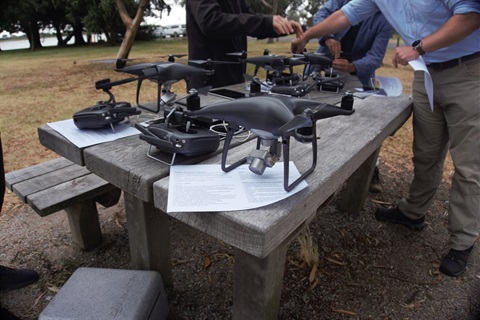Drone survey training opportunity in Apollo Bay
Published on 22 July 2025

We are teaming up with DEECA and Deakin University on the Victorian Coastal Monitoring Program (VCMP), and we're on the lookout for enthusiastic community members to help collect vital data on coastal change.
Get trained, get flying:
A free 2-day drone survey training will be held in Apollo Bay on July 29–30. No experience needed — just a willingness to learn and lend a hand! We do apologise for the short notice - the opportunity to expand this training to community members was only recently approved.
How to apply:
If you are interested in completing this training please register your expression of interest by emailing Dr. Lachlan Howell at l.howell@deakin.edu.au by midday Friday July 25th with attendees being confirmed by 5pm that day.
Please note if we get more people apply than places on this course you will be placed on a waitlist for future courses.
Why sign up?
• Build practical drone and survey skills
• Support your local community
• Contribute to collecting essential coastal change data
Future surveys may be in Apollo Bay assisting the local community group or there may be other requirements for surveys all along the coast (pre and post storms etc.).
There's no ongoing commitment — help only when you're available.
Project Background, purpose and agenda:
The Victorian Coastal Monitoring Program (VCMP) was established in 2017 with aims to:
• increase our understanding of how coastlines change over time.
• assist with managing coasts in the present.
• provide knowledge to ensure coasts are resilient in the future.
Increasing sea levels and more frequent storm events mean that Victoria’s coastline may be subjected to increasing coastal erosion and inundation. Coastal monitoring is crucial to understanding coastal change and provides an evidentiary basis for sound coastal management and adaptation.
A critical goal of the VCMP is to aggregate and integrate data from the local to statewide scale, to aid decision-making at local and regional levels. The VCMP is now a major field monitoring and knowledge management program that provides coastal managers and communities with information on coastal processes and hazards.
The training will equip members of the local community (and GORCAPA staff) with the knowledge and practical experience required to conduct independent drone surveys using small low-cost drones to assess and monitor shoreline change, sand erosion, land slips and sand height in their local area.
Dates: 29th and 30th July 2025
The schedule for 29/07/2025 is:
9am to 11am
• Meet in Apollo Bay – meeting place TBD
• Initial safety briefing and overview of UAV regulations
• Airframe setup and checklists
• Head to flying field – location TBD
• Flight manoeuvre demonstration.
• Begin practical flight training
11am to 11:30am – morning tea
11:30 to 1pm
• Practical flight training
1pm to 2 pm – Lunch
2pm to 4pm
• Automated mission planning and operation training
• Practical flight training
• Packdown and debrief
4pm – Finish
The schedule for 30/07/2025 is:
8am to 12pm
• Meet in Apollo Bay – meeting place TBD
• Participate in actual survey of the Apollo Bay site
This flight training is permitted without the CASA Operator Accreditation regulations (you are completing your recommended 5 hours of practice before operating commercially). However, if you wish to operate after the training, you will need to apply for an Aviation Reference Number (ARN) which is free and complete the Excluded Class RPA Operators Accreditation on the CASA website (also free). Below are links to the online forms:
ARN: https://www.casa.gov.au/licences-and-certificates/aviation-reference-numbers/organisation-aviation-reference-numbers
Operator Accreditation allows for Commercial Operations under 2 kg: https://www.casa.gov.au/drones/get-your-operator-credentials/operator-accreditation
Please dress sensibly to the conditions. It is recommended you bring a raincoat and sensible shoes in case of wet conditions.
Also please bring the following:
• Comfortable clothes
• A sun-smart hat
• Sunscreen
• Water bottle
• Sunglasses (and eye-glasses if you need them to see at distance)
• Warm clothes
• Snacks/lunch (there will be time to duck to the shops over lunch)